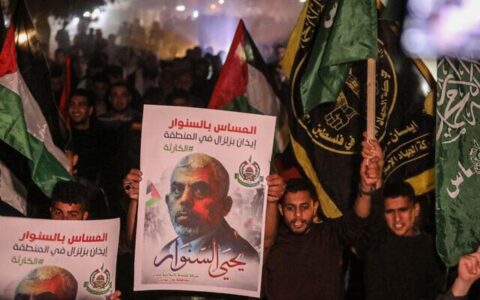
Israeli authorities believe Hamas not driving terror spate but riding the wave
Military analysts believe the Hamas terror group is not behind a recent string of deadly terror attacks, but has rather been “riding the wave” to encourage further violence, defense officials said Monday.
In an assessment delivered to political leaders, the Israel Defense Forces presented a picture of the terror group milking the successful assaults for their PR value and to push more Palestinians to take similar action. The group was not directly involved in orchestrating the attacks, the IDF said, even one that it claimed responsibility for.
Nineteen people have been killed and several more have been hurt in a series of attacks in Israel and the West Bank since March 22. Several recent terrorists have been claimed by Hamas as members, but the group has stopped short of claiming responsibility in most cases, aside from a deadly attack in Ariel late last month.
Hamas’s Gaza leader Yahya Sinwar has been fingered by Israeli leaders and pundits for fiery speeches urging attacks and calls for his assassination growing louder in recent days, despite the near-certain possibility that it would spark a new war.
However, the military does not believe Sinwar to be a major inciting factor driving the attacks, describing Hamas as reactionary, rather than enterprising.
An Israeli hit on Sinwar or another senior Gaza terror leader would almost certainly spark a fresh round of hostilities, just a year after an 11-day war that left both Israel and the Palestinian enclave deeply scarred.
The military assessment said the attacks were largely fueled by religious and nationalist tensions, including recent clashes on Jerusalem’s Temple Mount. Separately, at least three of the attacks were inspired by the Islamic State jihadist movement.
The Israeli army stepped up its West Bank activities in an attempt to crack down on the spiraling violence, deploying 26 battalions to the area.
At least 29 Palestinians have been killed by Israeli forces since mid-March, some while committing attacks and others during clashes. Some also appeared to have been unarmed or were uninvolved bystanders.
The Israel Defense Forces was expected to again ramp up operations in the northern West Bank, after several Palestinians who carried out recent terror attacks — including Thursday’s deadly axe attack in Elad — came from the area.
The IDF also believes that its ability to deter a major clash with Gaza remains effectual, despite rising tensions there as well. The assessment predicted that the chances for a major escalation in fighting in the near future were low, branding recent months as relatively stable.
But Channel 12 news reported Monday evening that “significant differences” have developed between Prime Minister Bennett and security officials as the sides hold consultations to discuss their response to the terror wave.
According to the network, the IDF and Shin Bet urged leaders to maintain a separation between the various fronts, and not escalate the situation in the Gaza Strip due to attacks in Israel and the West Bank.
The organizations suggested focusing mainly on reducing the religious extremism at Al-Aqsa Mosque in Jerusalem.
But Bennett has disagreed, arguing that Sinwar must pay a price for the incitement and for his encouragement of terror attacks. Bennett told the security chiefs to give him a range of options for the West Bank and Jerusalem, but also for Gaza, according to the network.
The Prime Minister’s Office and security organizations refused to comment on the Chanel 12 report.
The consultations came as the army undertook a major exercise slated to run for the next four weeks.
The drill, dubbed “Chariots of Fire,” will be one of the largest exercises in decades, involving thousands of soldiers from nearly all units of the IDF.
It was postponed last year ahead of the 11-day war with terror groups in the Gaza Strip.
Source: TOI





